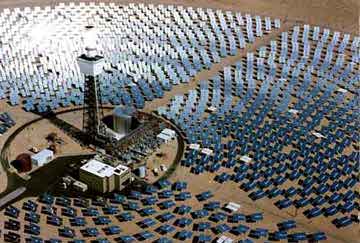California approves novel reverse auction for renewable energy projects

The California Public Utilities Commission recently approved a unique way to spur development in renewable energy. Under the Renewable Auction Mechanism (RAM), the big three public utilities in California are required to hold auctions twice a year for renewable energy projects.
The projects must be completed within 18 months and will be between 1 and 20 MW in size. As in an eBay reverse auction, the lowest bid for a viable project wins, followed by higher bids. The hope here is to avoid what happened in Spain when a solar boom ended up crashing after a production cap was met and subsidies stopped. With RAM, developers of solar, biomass, wind and geothermal projects can in effect get funding for their small to midsized projects with the understanding they need to be operational quickly. Such projects can be built much faster than huge desert-based solar projects, which while they can output large amounts of power, can also take years to build.
Adam Browning of Vote Solar says "With this program I think you'll see a lot of photovoltaic systems on otherwise unusable land, like railroad rights-of-way or wastewater plants that have lots of roof space." Indeed, that's the advantage of smaller projects, they can be built in all sorts of places that larger power plants can't be.
RAM caps out at 1 GW, enough to power 750,000 homes, with the power split equally between the big three utilities. If it's successful, the plan will surely be expanded. Can it work? One obvious pitfall is that projects get completed late, or are over budget, or in other ways the bid ends up not being profitable and the project is abandoned. Another potential problem is a lack of suitable transmission lines. Hopefully these smaller systems can be built closer to cities, where they would be both more efficient (because of less waste during transmission) as well as being able to use existing and adequate transmission lines. Also, I'm unclear as to whether these are one-time bids, if they expire (and what happens then?), and if they can be re-negotiated if needed.
Still, this seems a possibly game-changing way to jump-start more renewable energy production in California. In addition to creating energy, these projects will also create new jobs as well as tax revenues, something that will be surely be welcome.
In other renewable energy news, the California Energy Commission approved two new massive solar thermal projects in Riverside County. They will produce a combined 650 MW and create 1,700 jobs during construction. The 500 MW Palen Solar I will be between Indio and Blythe, with two solar trough thermal electric facilities on about 4,330 acres of BLM land. The Rice Solar Energy Project will also bear Blythe on 1.387 acres of private land. It will output 150 MW using concentrating solar thermal power and molten salt to store the heat for future use. Both projects use heat from the sun to power turbines to create the energy.



